Related Research Articles
Queer is an umbrella term for sexual and gender minorities who are not heterosexual or are not cisgender. Originally meaning "strange" or "peculiar", queer came to be used pejoratively against those with same-sex desires or relationships in the late 19th century. Beginning in the late 1980s, queer activists, such as the members of Queer Nation, began to reclaim the word as a deliberately provocative and politically radical alternative to the more assimilationist branches of the LGBT community.

LGBT or GLBT is an initialism that stands for lesbian, gay, bisexual, and transgender. In use since the 1990s, the term is an adaptation of the initialism LGB, which began to replace the term gay in reference to the broader LGBT community beginning in the mid-to-late 1980s. The initialism, as well as some of its common variants, functions as an umbrella term for sexuality and gender identity.
John Dickson Carr was an American author of detective stories, who also published using the pseudonyms Carter Dickson, Carr Dickson, and Roger Fairbairn.
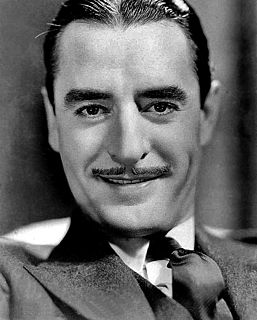
John Gilbert was an American actor, screenwriter and director. He rose to fame during the silent film era and became a popular leading man known as "The Great Lover". His legendary breakthrough came in 1925 with his starring roles in The Merry Widow and The Big Parade. At the height of his career, Gilbert rivaled Rudolph Valentino as a box office draw.

Amazing Stories is an American science fiction magazine launched in April 1926 by Hugo Gernsback's Experimenter Publishing. It was the first magazine devoted solely to science fiction. Science fiction stories had made regular appearances in other magazines, including some published by Gernsback, but Amazing helped define and launch a new genre of pulp fiction.

William Gannaway "Parson" Brownlow was an American newspaper publisher, Methodist minister, book author, prisoner of war, lecturer, and politician. He served as Governor of Tennessee from 1865 to 1869 and as a United States Senator from Tennessee from 1869 to 1875. Brownlow rose to prominence in the late 1830s and early 1840s as editor of the Whig, a polemical newspaper in East Tennessee that promoted Whig Party ideals and opposed secession in the years leading up to the American Civil War. Brownlow's uncompromising and radical viewpoints made him one of the most divisive figures in Tennessee political history and one of the most controversial Reconstruction Era politicians of the United States.
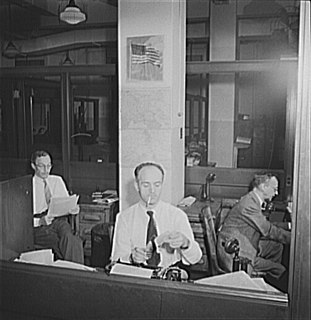
Print syndication distributes news articles, columns, political cartoons, comic strips and other features to newspapers, magazines and websites. The syndicates offer reprint rights and grant permissions to other parties for republishing content of which they own and/or represent copyrights. Other terms for the service include a newspaper syndicate, a press syndicate, and a feature syndicate.

The Whig was a polemical American newspaper published and edited by William G. "Parson" Brownlow (1805–1877) in the mid-nineteenth century. As its name implies, the paper's primary purpose was the promotion and defense of Whig Party political figures and ideals. In the years leading up to the Civil War, the Whig became the mouthpiece for East Tennessee's anti-secessionist movement. The Whig was published under several names throughout its existence, namely the Tennessee Whig, the Elizabethton Whig. the Jonesborough Whig, the Knoxville Whig, and similar variations.

Lesbian feminism is a cultural movement and critical perspective, most influential in the 1970s and early 1980s, that encourages women to focus their efforts, attentions, relationships, and activities towards their fellow women rather than men and often advocates lesbianism as the logical result of feminism.

Dame Margaret Isabel Cole was an English socialist politician, writer and poet. She wrote several detective stories jointly with her husband, G. D. H. Cole. She went on to hold important posts in London government after the Second World War.
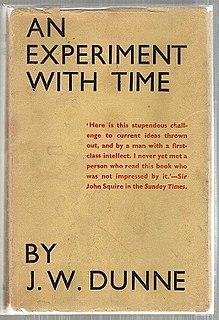
An Experiment with Time is a book by the British soldier, aeronautical engineer and philosopher J. W. Dunne about his precognitive dreams and a theory of time which he later called "Serialism". First published in March 1927, the book was widely read. Although never accepted by mainstream science, it has influenced imaginative literature ever since. Dunne published four sequels: The Serial Universe, The New Immortality, Nothing Dies and Intrusions?
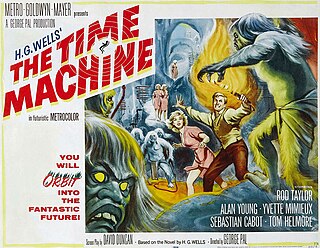
Time travel is a common theme in fiction, mainly since the late 19th century, and has been depicted in a variety of media, such as literature, television, film, and advertisements.

LGBT themes in comics are a relatively new concept, as lesbian, gay, bisexual, and transgender (LGBT) themes and characters were historically omitted from the content of comic books and their comic strip predecessors due to anti-gay censorship. LGBT existence was included only via innuendo, subtext and inference. However the practice of hiding LGBT characters in the early part of the twentieth century evolved into open inclusion in the late twentieth and early twenty-first centuries, and comics explored the challenges of coming-out, societal discrimination, and personal and romantic relationships between gay characters.

H. G. Wells was a prolific writer of both fiction and non-fiction. His writing career spanned more than sixty years, and his early science fiction novels earned him the title of "The Father of Science Fiction".
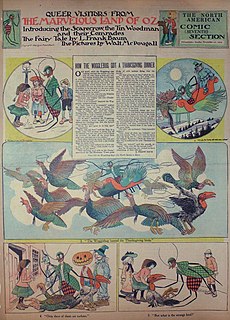
Queer Visitors from the Marvelous Land of Oz was a newspaper comic strip written by L. Frank Baum and illustrated by Walt McDougall, a political cartoonist for the Philadelphia North American. Queer Visitors appeared in the North American, the Chicago Record-Herald and other newspapers from 28 August 1904 to 26 February 1905. The series chronicles the misadventures of the Scarecrow, the Tin Woodman, the Woggle-Bug, Jack Pumpkinhead, and the Sawhorse, as the Gump flies them to various cities in the United States. The comic strip in turn produced its own derivation, The Woggle-Bug Book (1905).
The Infinite Worlds of H. G. Wells is a four-hour television miniseries conceived by Nick Willing and released in 2001 by the Hallmark Channel. It is based on a number of short stories by H. G. Wells, and in some territories was titled The Scientist.
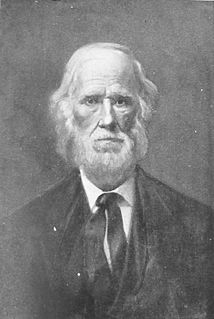
James Gettys McGready Ramsey was an American historian, physician, planter, slave owner, and businessman, active primarily in East Tennessee during the nineteenth century. Ramsey is perhaps best known for his book, The Annals of Tennessee to the End of the Eighteenth Century, a seminal work documenting the state's frontier and early statehood periods. Ramsey was also a major advocate for development in East Tennessee, leading efforts to bring railroad access to the region, and helping to organize the region's first medical society.
The Knoxville Register was an American newspaper published primarily in Knoxville, Tennessee, during the 19th century. Founded in 1816, the paper was East Tennessee's dominant newspaper until 1863, when its pro-secession editor, Jacob Austin Sperry (1823–1896), was forced to flee advancing Union forces at the height of the Civil War. Sperry continued to sporadically publish the Register in Atlanta, and later Bristol, until he was finally captured by Union forces in December 1864.

Walter Hugh McDougall was an American cartoonist. He produced some of the earliest full color newspaper comic strips, and was one of the first producers of regular political cartoons in American daily papers. His satirical cartoons, published in outlets such as the New York World and The North American, were influential in the 1884 U.S. presidential election, and soon after political cartoons became a fixture in American papers. He also drew children's comic strips, including Queer Visitors from the Marvelous Land of Oz written by L. Frank Baum, and has been called the first syndicated cartoonist for his contributions to the weekly columns of humorist Bill Nye. His books include The Hidden City (1891) and The Rambillicus Book (1903).
References
- ↑ A note on page 449 of the 2005 Penguin Classics paperback edition of The Shape of Things to Come suggests that the first publication of "Brownlow's Newspaper" was in the London Evening Standard, 31 October 1931.